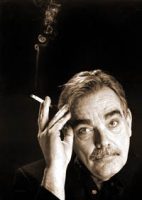July 28, 2016
Edited by David Sanders
Specimen Days
1456—Jacopo Sannazaro, Italian poet (Arcadia), is born.
1844—Gerard Manley Hopkins, England, poet (Windhover), is born.
1902—Kenneth F Fearing, US, poet (Dead Reckoning), is born.
1927—John Ashbery, American poet, is born.
1929—Remco [Wouter] Campert, Dutch literary/poet/son of Jan Campert, is born.
1950—Shahyar Ghanbari, Iranian poet, is born.
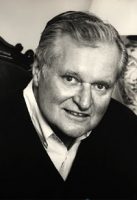
So I cradle this average violin that knows
Only forgotten showtunes, but argues
The possibility of free declamation anchored
To a dull refrain, the year turning over on itself
In November, with the spaces among the days
More literal, the meat more visible on the bone.
Our question of a place of origin hangs
Like smoke: how we picnicked in pine forests,
In coves with the water always seeping up, and left
Our trash, sperm and excrement everywhere, smeared
On the landscape, to make of us what we could.
—from “Street Musicians” by John Ashbery
Our trash, sperm and excrement everywhere, smeared / On the landscape, to make of us what we could.— John Ashbery
World Poetry
Israeli Defense Chief Raps Radio Boss for Show on Palestinian Poet Mahmoud Darwish
IDF spokesman weighs in against Army Radio as defense minister mulls its future
Defense Minister Avigdor Lieberman has summoned Army Radio chief Yaron Dekel because of the broadcast Tuesday night about Palestinian poet Mahmoud Darwish – part of a series on formative Israeli texts in the station’s “University on the Air” program.
“This is a serious issue in which someone who has written texts against Zionism – which are still used as fuel for terror attacks against Israel – is included with his works as part of Israeli society’s formative texts,” Lieberman said via his communications adviser.
Leader’s Poems Grip Brazilians, but Not in a ‘Fiery Flames’ Way

Before becoming Brazil’s interim president, Michel Temer had a bit more free time on his hands. As a lawmaker shuttling between Brasília and São Paulo a few years ago, he found himself jotting his musings on cocktail napkins in airport lounges. In 2013, his first book of poetry, “Anonymous Intimacy,” was published, drawing mostly yawns from Brazilians. Mr. Temer, 75, a button-down career politician whose demeanor is so cryptically ceremonious that his rivals liken him to a butler in a horror movie, was apparently inspired by an array of themes.
Brazil’s interim president Michel Temer is also a published poet.
Recent Reviews
Hagit Grossman’s Trembling but Open Space
Trembling of the City by Hagit Grossman, beautifully translated by Benjamin Balint, gives us the city of the mind and the body, the city of bicycles, market squares, corner margins, villains, sidewalks, cooks from Florentine street, but most of all this is a city of love, a city that trembles with “the speed of everything,” the city where Sylvia Plath and Snow White and Desdemona make up the hall of ghosts where “any open space receives a sign,” where “anyone who stopped will say stop” and eyes “return lit up” in this city and if “blood waters the flowerpot on balcony” it is because you are “in love with love,” it is because you “have encountered love / on a night meant only for a funeral,” it is because the voice tells us “I haven’t been loved for a year now. / These are my last words in a little while / I’ll celebrate liberation from my body.” And yet we realize that there are many departures.
Book Review: Only More So by Millicent Borges Accardi
by Sam Pereira
When one first picks up a copy of Only More So, the new collection of poetry by Millicent Borges Accardi from Salmon Poetry in Ireland, there is an overwhelming expectation that delicacy is about to mingle with honesty, resulting in some magnificent looking words as the children from that union. With that to hold on to, as well as the book’s surprisingly magnetic artwork, the reader is immediately hit with an understanding that Ms. Borges Accardi is not new to the challenges that contemporary poetry serves up.
Centres of Cataclysm review – 50 years of Modern Poetry in Translation
Edited by Sasha Dugdale and David & Helen Constantine, this anthology illustrates that Ted Hughes’s magazine is still invaluable
by Sean O'Brien
Selected by distinguished previous and current editors, this ample anthology celebrates 50 years of the excellent Modern Poetry in Translation. The magazine was originally conceived by Ted Hughes and Daniel Weissbort as a “rough” broadsheet, but its “roughness” was finely designed, like a branch of the alternative publishing of the 1960s that also gave us important small presses and underground publications. The core of the magazine’s early interests lay in poetry written behind the iron curtain or under nazism, work that, it seemed to Hughes and others, possessed an urgency and universality missing from the west. Among those the magazine has brought to attention are Miroslav Holub, Vasko Popa, János Pilinszky, Paul Celan, Maria Tsvetaeva, Natalya Gorbanevskaya, Tadeusz Różewicz and Zbigniew Herbert. That’s quite a roll call.
“Centres of Cataclysm” is an ample anthology that celebrates 50 years of the excellent Modern Poetry in Translation.
Broadsides
I Had to Cut It Down: An Experiment in Destructive Criticism
by Ty Clever
The role of the critic is the topic de jour, in part because of the smart and accessible book Better Living Through Criticism, recently published by New York Times film critic A. O. Scott. Scott floats several thought-provoking observations, but I found this one particularly compelling:
The critic’s task is to trace a twisted, looping, stutter-stepping, incomplete path toward the truth, and as such to fight an unending battle against premature and permanent certainty.
‘The Lights of Brindisi’
A poem by Yves Bonnefoy, who died in July this year; introduced by Andrew McCulloch
Yves Bonnefoy (1923–2016), who died at the beginning of this month, was widely considered to be the most important and influential French poet of the past sixty years. He believed that since language excludes us from any “authentic intimacy” with the world, we need poetry “to remember that we miss it” and to prove to ourselves the value of “those moments when we are able to encounter other people, or trees, or anything”. This appeal to reality, traces of whose original perfection persist on earth and which it is the poet’s task to collect and reassemble, haunts Bonnefoy’s poetry and his attempt to recreate “le vrai lieu” – the real world – uncontaminated by any kind of intellectual interference. In order to achieve présence it was necessary to free language from the conceptual framework that weakens its original symbolic force: as he remarked, “to say is no longer to enter on the description of what is”.
Eliot’s Scientific ‘Tendencies’ in 1919
by Duncan MacKay
An interesting article in PN Review 228 (March–April 2016) by Robert Griffiths presents us with the ‘curiously coincidental’ emergence of modernist poetry alongside the revolution in physics represented by Einstein’s 1905 and 1915 papers on Special and General Relativity. Griffiths suggests ‘the fact [is] that all of this revolutionary poetry and physics (and psychology), as well as a great deal else, was going on in a mutually unrelated way’. Griffiths is right to distinguish 1915 from 1919 as far as Einstein’s notoriety and its wider cultural significance was concerned; Einstein’s work was previously little known outside even a small circle of physicists. However, while influences at any time can be subtle and complex, Griffiths’s general assertion of ‘a mutually unrelated way’ after 1919 is surely not tenable.
The Very Quiet Foreign Girls Poetry Group
It all came from Priya’s poem, and Priya’s poem came from – well, I had no idea. It was an unlikely thing to turn up in a pile of marking. Yet there it was, tucked between two ordinary effusions, typed in a silly, curly, childish font, a sonorous description, framed with exquisite irony, of everything she couldn’t remember about her “mother country”.
The critic’s task is to trace a twisted, looping, stutter-stepping, incomplete path toward the truth.
Drafts & Fragments
Kirsten Dunst to Direct The Bell Jar Starring Dakota Fanning
Kirsten Dunst is to make her debut as a director with an adaptation of Sylvia Plath’s The Bell Jar. Dakota Fanning has been announced in the lead role of Esther Greenwood, a young woman who takes an internship at a magazine in New York before suffering a breakdown and returning home to Boston.
A Poetry Storm is Coming to Biloxi’s Sidewalks
Unsuspecting pedestrians walking throughout downtown Biloxi soon will find some bright spots on rainy days with hidden poetry that reveals itself when wet. Haiku’s, quotes and original poetry will appear one wet sidewalks and streets in downtown Biloxi for 3-4 weeks beginning Monday.
Kirsten Dunst is to make her debut as a director with an adaptation of Sylvia Plath’s The Bell Jar.
Poetry In the News
Muslim Teenagers Use Slam Poetry To Educate Others About Their Faith
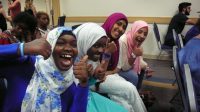
“September 11, 2001, wake up America the enemy is here.” This is how a group of four Muslim American teenagers, who hope to change the culture of discrimination toward Muslims through the art of slam poetry, start their poem, “Wake Up America.”
A group of four Muslim American teenagers has written a poem called “Wake Up America” which explores the culture of discrimination toward Muslims.
New Books
The Princeton Handbook of Poetic Terms: Third Edition
edited by Roland Greene and Stephen Cushman
[Paperback] Princeton University Press, 456 pp., $35.00
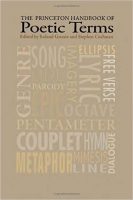
The Princeton Handbook of Poetic Terms–drawn from the latest edition of the acclaimed Princeton Encyclopedia of Poetry and Poetics–provides an authoritative guide to the most important terms in the study of poetry and literature. Featuring 226 fully revised and updated entries, including 100 that are new to this edition, the book offers clear and insightful definitions and discussions of critical concepts, genres, forms, movements, and poetic elements, followed by invaluable, up-to-date bibliographies that guide users to further reading and research. Because the entries are carefully selected and adapted from the Princeton Encyclopedia, the Handbook has unrivalled breadth and depth for a book of its kind, in a convenient, portable size. Fully indexed for the first time and complete with an introduction by the editors, this is an essential volume for all literature students, teachers, and researchers, as well as other readers and writers.
Human Interest by Kim Bridgford
[Paperback] White Violet Press, 92 pp.,$17.00

Kim Bridgford’s latest collection offers both her customary technical pleasures and a new, half-astonished rage. Filled with kidnapped girls and off-kilter animals (“it is all about what’s rearranged”), bookended by revisions of Facebook and clichés, Human Interest demands that we re-think poetic forms as more than heritage, challenge, or trap: they are Bridgford’s own strong bones stood up hard against a seriously skewed world.—Terri Witek
Oracle: Poems by Cate Marvin
[Paperback] W. W. Norton & Company, 96 pp., $16.95
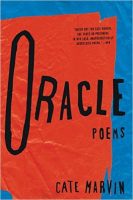
The speakers of Oracle occupy the outer-borough cityscape of New York's Staten Island, where they move through worlds glittering with refuse and peopled by ghosts―of a dead lover, of a friend lost to suicide, of a dog with glistening eyes. Marvin's haunting, passionate poems explore themes of loss, of the vulnerability of womanhood in a world hostile to it, and of the fraught, strangely compelling landscape of adolescence.
Correspondences
Poets Take Cues From Journalism In Recent Collections
NPR's Ari Shapiro talks with our poetry reviewer Tess Taylor about three recent collections that take their cues from nonfiction, including Admit One by Martha Collins, Look by Solmaz Sharif and Olio by Tyehimba Jess.
“Reckoning with Our Hungers: An Interview with Shane McCrae”
by Cate Lycurgus

Shane McCrae is the author of four books of poetry: The Animal Too Big to Kill (Persea Books, 2015), winner of the 2014 Lexi Rudnitsky/Editor’s Choice Award; Forgiveness Forgiveness (Factory Hollow Press, 2014); Blood (Noemi Press, 2013); and Mule (Cleveland State University Poetry Center, 2011). He is the recipient of a Whiting Writers’ Award and a National Endowment for the Arts Fellowship. He teaches at Oberlin College and lives in Oberlin, Ohio.
Matthea Harvey Talks with US about Craft, VIDA, and Killing the Cuteness
by Jane Huffman

Jane Huffman: We can start with something miniature. I’ve always wondered—do you keep the items from your art pieces after you photograph them? I’m specifically thinking about all of the dollhouse accoutrements and embroidery pieces in Tabloids; are your bookshelves covered in tiny chairs? (If so, can we see?)
Shane McCrae is the author of four books of poetry: The Animal Too Big to Kill (Persea Books, 2015).
Envoi: Editor’s Notes
Below is a review of Larry Levis's last book, which includes many previously unpublished poems. Although the book has been available since the beginning of the year, the review is new, and I post it here in light of the recent rumors that the Democratic nominee for vice president, Tim Kaine, studied poetry with Levis.
Poet of The The: “The Darkening Trapeze” by Larry Levis
By Kathleen Graber
To hold a new collection of poems by Larry Levis is nearly miraculous. The Darkening Trapeze arrived as an immeasurable gift, not only as a final gift from the poet himself, but also, unquestionably, as a gift from his friends — David St. John, the book’s editor, as well as Greg Donovan, Mary Flinn, Amy Tudor, and the late Philip Levine — who collectively carefully preserved and assembled these poems from Levis’s disorderly papers, correspondence, and computer files.
To hold a new collection of poems by Larry Levis is nearly miraculous.
